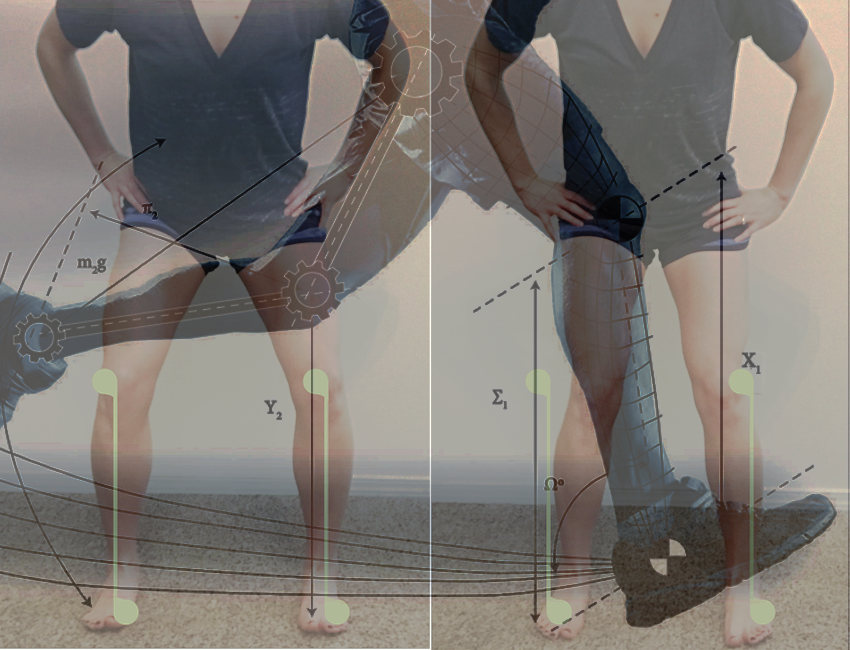Muscles and Movement part 1 of 3
Biomechanics & Alignment
is relative to the way you move, how the impact of forces within and on the body as you move add/lower your risk of injury. And the movement patterns you require to function as you want to day by day with minimal injury risk.
Efficiency in biomechanics looks at both strength and cardio fitness- we want to use the least amount of energy for the greatest return.
Biomechanics as defined by the National Institute of Health
‘‘the study of forces acting on and generated within the body and of the effects of these forces on the tissues, fluids, or materials used for diagnosis, treatment, or research purposes’.
“Biomechanics, (from Ancient Greek: βίος “life” and μηχανική “mechanics”), is the application of mechanical principles to living organisms, such as humans, animals, plants and the functional basic units of life, the cells. It is now widely recognized that biomechanics plays an important role in the understanding of the fundamental principles of human motion”- (1) NIH
What Does This Mean?
Looking the energy generated by the muscles as we move to facilitate on-going movement, and how the impact of the outside world and surfaces creates a reverb effect through the body in its entirety. It's fair to say then that simply walking from A-B has an impact on our muscles, joints, bones, as well as the other systems in our body. If the walking pattern is changed that has the potential to affect at least the muscular-skeletal system. If the muscular-skeletal system is compromised in any way for prolonged periods of time that can affect our overall well-being as with deal with pain and discomfort.
As Personal Trainers (PT’s) at Embrace Life UK over the last 10-years we have become specialised in understanding movement patterns to assist (as much as we can) in the reduction of joint and muscular pain. Understanding movement in line with biomechanics affords us the following benefits:
Quicker Recovery
Prolonged Participation in every-day life over a longer time-frame
Healthy ageing
Performance for everyday and specialist activities
Mental health and cognition- there is growing body of research there especially around age-related diseases such as Alzheimer’s and dementia (2)
Biomechanics, Sport, and Recreational Activities
Certain sports or recreational activities such as Cross-Fit, running, triathlon as non-contact activities have high injury rates amongst amateurs. One reason for this is the intensity and form are often mis-understood in training. Example, cross-fit is notorious for upping intensity at the risk of repeated compromise to form- compared to body building where form matters more than intensity, injury risk is lowered. Intensity is measured by weight and speed of performing a movement. Cardio is speed, strength is weight/resistance.
You are more likely to get a life-long body builder that you are a life-long Cross Fitter. This is not about one being better than the other, they meet different needs, for example Cross-Fit is social whilst Body Building is a solo pursuit, over time they build different physiques. If you are performing with weights for both speed and power then you need to regularly assess form and joint impact in order to appropriately look after the body. This is when it's good to work with a trainer or have someone 'spot' you who knows what they are looking for.
For us this is biomechanics with alignment. Whilst we do take into account that cultural genetics and cultural environmental factors plays a part here, we have consistent positive results using the biomechanics model alongside the alignment theory. More research needs to be done on the area from a clinical point of view, from a practice point of view the results are encouraging.
At Embrace Life UK we stick to fundamental principles in movement and exercise as we do in nutrition and well-being to help our clients understand how to achieve what they want in the safest way to maintain their results. The majority of our clients have simply wanted to feel healthier, drop a few kilograms, gain lean muscle tone, reduce or recover from various joint/back pains. Our Body Alignment check-up has allowed clients who are looking for joint or low-back pain solutions to be assessed, have a programme written to meet their assessment requirements which they can do on their own home or at the gym without need of personal training sessions with us. We are particularly pleased with this as it meets our aim of being able to provide sustainable value without consistent investment, making us a feasible choice to a wider population. We would rather empower and help more people than concentrate on a few.
Download our Exercise for Beginners or look at our Health and Fitness Coaching offer
I hope you enjoyed this article and took some useable knowledge from it to help you understand your biology and meet your needs in relation to your goals. Please leave a comment, press the heart button and share it to help more people take control of their health, well-being and fitness.
References
1 https://pmc.ncbi.nlm.nih.gov/articles/PMC5908324
2 https://pmc.ncbi.nlm.nih.gov/articles/PMC11034590/#:~:text=In%20summary%2C%20there%20is%20a,cognitive%20problems%2C%20and%20vice%20versa.
In Part 2 of this article we will explain more about Muscles and Movement notes for healthy ageing and cognitive performance
In Part 3 of this article we will look at Muscles and Movement notes for Amateur and Professional athletes
If you are a visual reader and like information in smaller increments use our Pinterest board on Muscles and Movement and Pinterest Board on Physiology


